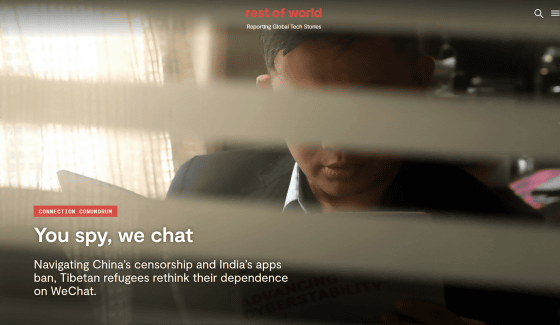Tibetan refugees are in contact with family and friends on WeChat knowing the danger of being censored by the Chinese government

The instant messenger app
WeChat helped reunite Tibetan refugees. But at what cost?-- Rest of World
https://restofworld.org/2020/china-surveillance-tibet-wechat/

Tibetan refugee Tenzin Choedak escaped from Tibet with his uncle and defected to India in 1991. In the past, Choedak, who lives in India, was the only way to contact his family in Tibet through expensive landlines, and he was a boy who was unable to contact his family freely. However, Choedak, who is in his early twenties, says that he can now use his WeChat installed on his smartphone to regularly contact his family.
Developed by Tencent in 2011, WeChat has become the most popular social media platform among the 90,000 Tibetan refugees living in India. Since Facebook and Google services are not available in Tibet, WeChat is a valuable communication tool for refugees to reach out to their families in Tibet.
WeChat checks the user's remarks and takes measures such as suspending the account of the user who sent the problematic message, and it is pointed out that it is used for censorship by the Chinese government. Still, many Tibetan refugees, including Mr. Choedak, believe in WeChat, which helps them stay in touch with family and friends in China. Tenzin Dalha, a researcher at the Tibet Policy Institute in India, points out that WeChat has become popular among Tibetan refugees because WeChat was 'the only way to talk to loved ones' for Tibetan refugees.
Candidates also used WeChat to campaign in the

WeChat has become a tool to connect Tibetans around the world, including refugees in exile, but there is concern that it could be used as a censorship and surveillance tool by the Chinese government. Because WeChat is based in China, we must disclose your information to the government in accordance with the Cyber Security Act when the Chinese government makes a request.
``WeChat is widely engaged in censorship and flagging user accounts to share controversial information at the request of the Chinese government,'' said Lobsang Sither, leader of the Digital Security Program at the Tibet Behavior Institute. It's known, so Tibetans need to understand the risks associated with using the app.'
According to The Citizen Lab , an academic institute that studies network neutrality and security at the University of Toronto , words such as 'Tibetan independence movement' 'Liberation of Tibet' 'Tibetan human rights organization' ' Tibetan youth conference ' are blocked on WeChat It is said that. 'Depending on the keyword you use, the entire conversation may be censored or your account may be flagged as monitored,' Sither said.
According to the Tibetan Behavior Research Institute, at least 29 Tibetans have been arrested and detained in 2014-2019 alone in connection with posting to WeChat. In July 2019, a Tibetan man from Sichuan was detained for 10 days sharing a photo of the Dalai Lama on WeChat, and in December nine people including environmental activist A-Nya Sengdra Tibetans were sentenced to up to seven years in prison for creating WeChat groups on local government corruption and environmental protection. In July 2020, two musicians who shared the song 'A Song for the Dalai Lama' on WeChat were sentenced to seven years in prison.

Many Tibetans are avoiding political discussions on WeChat and are not talking about the Dalai Lama or Tibetan independence movement. On the other hand, it seems that some users use delicate words to touch delicate topics, use the phrase 'How is the weather?' to ask about the political situation in Tibet, use the Dalai Lama as an 'uncle', or an official of the Chinese government. They call them 'neighbors'.
WeChat deletes messages via the remote server before they reach other users, so Tibetan users can't know what words get caught in censorship. As a result, Sither says he must resort to self-censorship when sending text.
In addition, in June 2020, the Indian government banned the use of a total of 59 Chinese-made apps including TikTok and WeChat following the collision between the two armies near the border between India and China and the death of at least 20 Indian soldiers. Announced . The target app has stopped working for almost two weeks, and we were unable to get in touch with WeChat using a VPN .
While some people were grieving that the Indian government's ban on Chinese apps caused various reactions among Tibetan refugees and lost contact with their families, ``This is a risk of censorship by the Chinese government WeChat. Some people thought, 'It's a chance to get out of it.' 'We are very pleased with the decision of the Government of India and urge all other developed countries to follow it,' said Gonpo Dhundup , chairman of the Tibetan Youth Conference.
The Tibetan Youth Conference, the largest independent group in exile Tibetan society, has been campaigning to boycott products made in China in 1980, and this time it is developing a boycott campaign targeting 'apps made in China' Seen as an opportunity to do so. ``We are urging us to remove Chinese apps because of security concerns, but many people use WeChat to keep in touch with their families,'' said Tenzing Jigme, former chairman of the Tibetan Youth Conference. 'The move is getting tougher. The Indian government's ban on Chinese apps is an indirect way to help our cause.'

Tibetan refugee activists have also encouraged many refugees to leave WeChat, while also admitting that WeChat has helped keep in touch with the rest of China, and that it is inconvenient if their use is banned. .. As an alternative, it is proposed to use VPN to avoid the Chinese shield of internet censorship system, and to exchange using an encryption application that can not be tied to a personal phone number. ..
Related Posts:
in Software, Web Service, Smartphone, Security, Posted by log1h_ik







